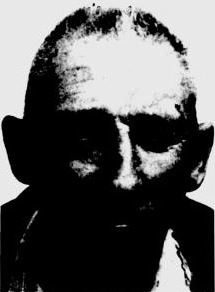 Courtesy photo Dubuque Telegraph-Herald
Courtesy photo Dubuque Telegraph-HeraldKenneth Marvin Bouzard
Kenneth Marvin Bouzard
Homicide
Kenneth Marvin Bouzard
53 YOA
DCI Case Number: 71-00481
Hodges Warehouse
Seventh and Jackson streets
Dubuque, Iowa
Dubuque County
April 23, 1971
Case Summary compiled by Jody Ewing
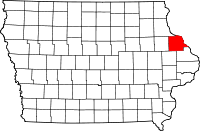 Dubuque County in Iowa
Dubuque County in Iowa
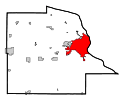 Dubuque in Dubuque County
Dubuque in Dubuque County
In the early morning hours on Friday, April 23, 1971, Kenneth Marvin Bouzard was clubbed to death and then stuffed beneath a freight car in downtown Dubuque.
The 53-year-old Bouzard — a Ladysmith, Wis. native who served in the South Pacific during World War II — had spent much of his adult life hopping the freight trains from one town to another.
According to a Dubuque Telegraph-Herald story published May 7, 1972, Bouzard had been jailed in Minden, Nevada in mid-February on charges of intoxication and vagrancy, but told law enforcement officials upon his release that he was headed to Iowa.
Bouzard arrived in Dubuque on April 21 and checked in at the City Mission at 398 Main Street, and was up early the next morning to enjoy breakfast there.
The Telegraph-Herald said of Bouzard:
He was a respectable knight-errant who worked odd jobs when available. He was, in fact, a tradesman. And on that morning, having dressed in slacks, tie and jacket, he stopped by several downtown barber shops and beauty parlors, seeking whatever money was offered in return for sharpening scissors and other barber tools.
Bouzard purchased a bottle of Planters Club straight bourbon for $3.83 at the Iowa State Liquor Store on Central Avenue around 6 p.m. that night, but police were unable to trace his whereabouts afterward.
Just after 6 a.m. the following morning, two police officers responded to a call of a break-in to a semi-trailer truck parked next to the Hodges Warehouse at Seventh and Jackson streets. When they arrived to investigate, they found Bouzard’s body in a pool of blood beneath the boxcar next to the warehouse dock. His bottle of bourbon lay nearby, nearly empty.
Different Theories Lead to Body’s Exhumation
A Dubuque pathologist who performed Bouzard’s autopsy concluded the victim had been struck by a train, telling Dubuque police it would be “physically impossible” for anyone to wield a weapon with such force to cause the massive head injuries Bouzard suffered.
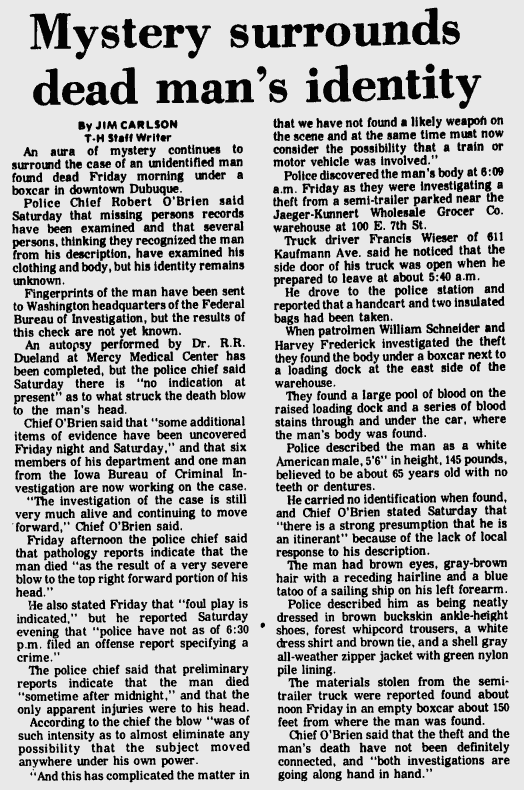
Courtesy the Telegraph-Herald, April 25, 1971
Linwood Cemetery officials recorded Bouzard’s cause of death as being “struck by a train,” but Dubuque detectives — which included five Dubuque police officers and three Iowa Bureau of Criminal Investigation (BCI) agents — refused to close the case.
“There were too many unexplainable facts that we had uncovered for us to go along with that ‘train accident’ theory,” Dubuque Police Chief Robert O’Brien is quoted as saying in the May 7 Telegraph-Herald story.
For instance, the Burlington Northern boxcar — number 160201 — under which Bouzard’s body was found hadn’t been moved since being placed at that location by railroad switchmen at approximately 11 a.m. April 22. Police interviews with crewmen confirmed the work orders showing no trains had passed through that area since train No. 80 went through the railroad yards April 22 at 11:42 p.m.
Detectives believed Bouzard was clubbed to death while sitting with his bottle near a lumber pile on the warehouse dock, and then either carried or dragged through the boxcar and placed along the railroad ties to make it appear he’d been struck by a moving train.
A make-shift club found on the warehouse dock was believed to be the murder weapon; though it contained no identifiable fingerprints, blood and hair particles found on the club matched Bouzard’s. The evidence was deemed sufficient enough for a District Court to grant permission to have the body disinterred for a second autopsy.
Bouzard’s body was exhumed and the second autopsy conducted May 20 by a University of Iowa pathologist. According to the Telegraph-Herald, the second report said:
“. . . the victim was struck at least twice on the head and possibly more times.”
The second autopsy report also concluded there was “no hint of a train accident being the possible cause of death.”
Three Transients vs. Three Dubuque Men
When detectives learned Bouzard was known to at least three other transients staying at the City Mission, all of whom had since left town, a nationwide bulletin was sent out requesting that law enforcement agencies pick up and detain the three transients.
The first transient was questioned in June 1971, the second in July and the third in September. All claimed they’d left town before Bouzard’s murder, and though each volunteered to take a lie detector test, none were administered.
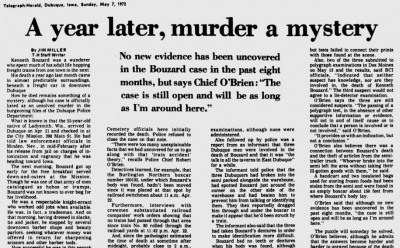
Courtesy the Telegraph-Herald, May 7, 1972
According to an informant, three Dubuque men were the ones responsible for Bouzard’s death. The informant told police the men had broken into the semi parked alongside the warehouse, and that when they spotted Bouzard, they’d beaten him to death to prevent him from talking or identifying them. They’d also taken Bouzard’s dentures, said the informant, to make identification of the body more difficult.
Police were unable to determine whether Bouzard had been wearing his dentures when he arrived in Dubuque.
Dubuque police questioned the three men, whose fingerprints were submitted to FBI authorities in Washington, D.C., but tests failed to connect them to prints found at the crime scene. Also, the Telegraph-Herald reported, two of the three men submitted to polygraph examinations in Des Moines on May 13, and BCI officials said the results “indicated that neither suspect has knowledge, nor are they involved in, the death of Kenneth Bouzard.” The third suspect refused to submit to a polygraph.
O’Brien said the three were still considered suspects. “The passing of a polygraph test, in the absence of other supportive information or evidence, will not in and of itself cause us to conclude that a person is involved or is not involved,” O’Brien is quoted as saying in the May 7 article.
O’Brien believed Bouzard’s death was connected to the articles stolen from the semi-trailer truck, which included a handcart and two insulated bags used for storing frozen foods. The items were found in an empty boxcar about 150 feet from where Bouzard’s body was discovered.
When the Iowa Division of Criminal Investigation (DCI) established a Cold Case Unit in 2009, Bouzard’s murder was one of approximately 150 cases listed on the Cold Case Unit’s new website as those the DCI hoped to solve using latest advancements in DNA technology.
Although federal grant funding for the DCI Cold Case Unit was exhausted in December 2011, the DCI continues to assign agents to investigate cold cases as new leads develop or as technological advances allow for additional forensic testing of original evidence.
The DCI remains committed to the resolution of Iowa’s cold cases and will continue to work diligently with local law enforcement partners to bring the perpetrators of these crimes to justice for the victims and their families.
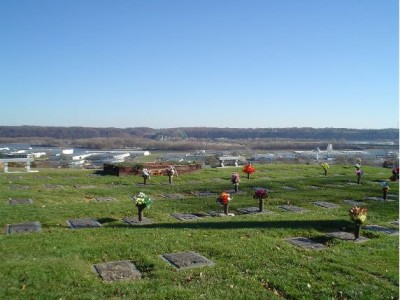 Courtesy photo “Jesse,” findagrave.com
Courtesy photo “Jesse,” findagrave.comKenneth Bouzard, a Ladysmith, Wis. native who served in the South Pacific during World War II, was buried in Dubuque’s Linwood Cemetery.
About Kenneth Bouzard
Kenneth Marvin Bouzard was born in Wisconsin in 1918 to Pennsylvania natives Carrie Martha Gagnon and William M. Bouzard. He was survived by his mother and a sister, Grace.
He was buried at the Linwood Cemetery in Dubuque.
Information Needed
Anyone with information regarding Kenneth Bouzard’s unsolved murder is asked to contact the Iowa Division of Criminal Investigation at (515) 725-6010, email dciinfo@dps.state.ia.us, or contact the Dubuque Police Department at (563) 589-4410.
Sources:
- Iowa Division of Criminal Investigation, former Cold Case Unit, November 25, 2009
- Dubuque Police Department
- United States Social Security Death Index
- Find a Grave Memorial
- “Kenneth M. Bouzard,” Linwood Legacies: A historical series,” linwoodlegacies.org
- “Marlon Barber’s death not only unsolved case in Dubuque,” by Becca Habegger, KWWL.com, October 8, 2013
- “A year later, murder a mystery,” by Jim Miller, Dubuque Telegraph-Herald, Sunday, May 7, 1972
- “Wisconsin Man Murder Victim,” Waterloo Daily Courier, May 4, 1971
- “Tentatively identify dead man,” by Jim Carlson, Telegraph-Herald, April 26, 1971
- “Mystery Man Identified In Dubuque,” Waterloo Daily Courier, April 26, 1971
- “Mystery surrounds dead man’s identity,” by Jim Carlson, Telegraph-Herald, April 25, 1971
- “Mystery Man Found Dead in Dubuque ‘Murdered,’” Cedar Rapids Gazette, April 24, 1971
Copyright © 2024 Iowa Cold Cases, Inc. All rights reserved. This material may not be published, broadcast, rewritten or redistributed.

 Courtesy photo Dubuque Telegraph-Herald
Courtesy photo Dubuque Telegraph-Herald
 Dubuque in Dubuque County
Dubuque in Dubuque County

 Courtesy photo “Jesse,” findagrave.com
Courtesy photo “Jesse,” findagrave.com
So sad for this man who seemed to enjoy his life just traveling around on trains and leaving day by day just getting by.